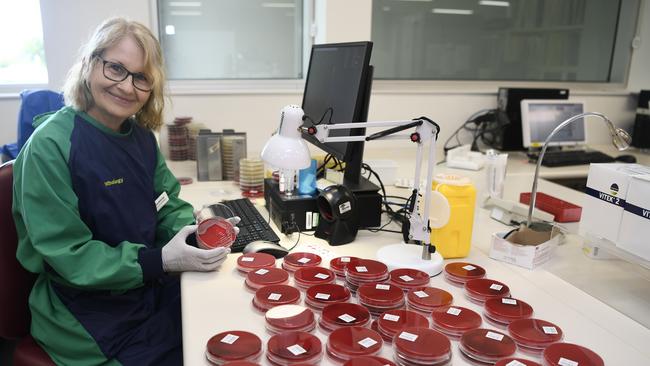Townsville Hospital laboratory recognised as leading centre for melioidosis diagnosis
A Townsville laboratory which diagnoses a deadly tropical disease that claims one in five victims has been recognised as Queensland’s go to centre for its excellence.

Townsville
Don't miss out on the headlines from Townsville. Followed categories will be added to My News.
A TOWNSVILLE laboratory which diagnoses a deadly tropical disease that claims one in five victims has been recognised as Queensland’s go to centre for its excellence.
Townsville Hospital’s pathology laboratory was given the title of State Reference Laboratory for melioidosis by Health Support Queensland – which manage 35 public pathology laboratories across the state.
Melioidosis is a disease caused by bacteria contained in the soil in North Queensland, usually entering the body through cuts and sores in the skin. It has a mortality rate of about 20 per cent.
Townsville’s laboratory will be promoted as a source of expertise on melioidosis for pathologists.
RELATED
Killer lurking in dirt claims three victims
Disease soars in North QLD flood aftermath
Deadly bacteria on unprecedented spread in city
Laboratory director Dr Robert Norton said the recognition would help attract funding for research.
“It also helps in recruitment, if a pathologist or scientists has a particular interest in melioidosis we become an attractive laboratory for them to work,” Dr Norton said.
“It also allows us to work with major metropolitan laboratories on supporting them in recognising this particular and rare diagnoses.”
Dr Norton said Townsville was the first laboratory in Australia to identify the soil-borne organism in the country.
“Townsville’s expertise in melioidosis has been developed over many years since we first identified the organism, he said.
“Our laboratory is actively involved in both diagnostics and research into this pathogen which makes our expertise quite unique.
“I’m extremely proud of the work that has been done to ensure that we are best placed to respond to this rare but very serious pathogen.”
Dr Norton said Townsville pathology staff had collectively published 40 peer reviewed journal articles and contributed to the development to an international guideline for diagnosing the condition as part of the Centre for Disease Control in Atlanta.
“The real benefit of being acknowledged as a State Reference Laboratory will be to assist our fellow laboratories across Australia in correctly diagnosing melioidosis,” he said.
“For laboratories in Brisbane, Sydney or Melbourne this will be a bacterium they have never seen but should they suspect melioidosis they just need to pick up the phone and we will assist with either advice or testing.”
There have been 22 confirmed cases of melioidosis across the Townsville Hospital and Health Service catchment in 2019 and sadly there have been four deaths.
Originally published as Townsville Hospital laboratory recognised as leading centre for melioidosis diagnosis


